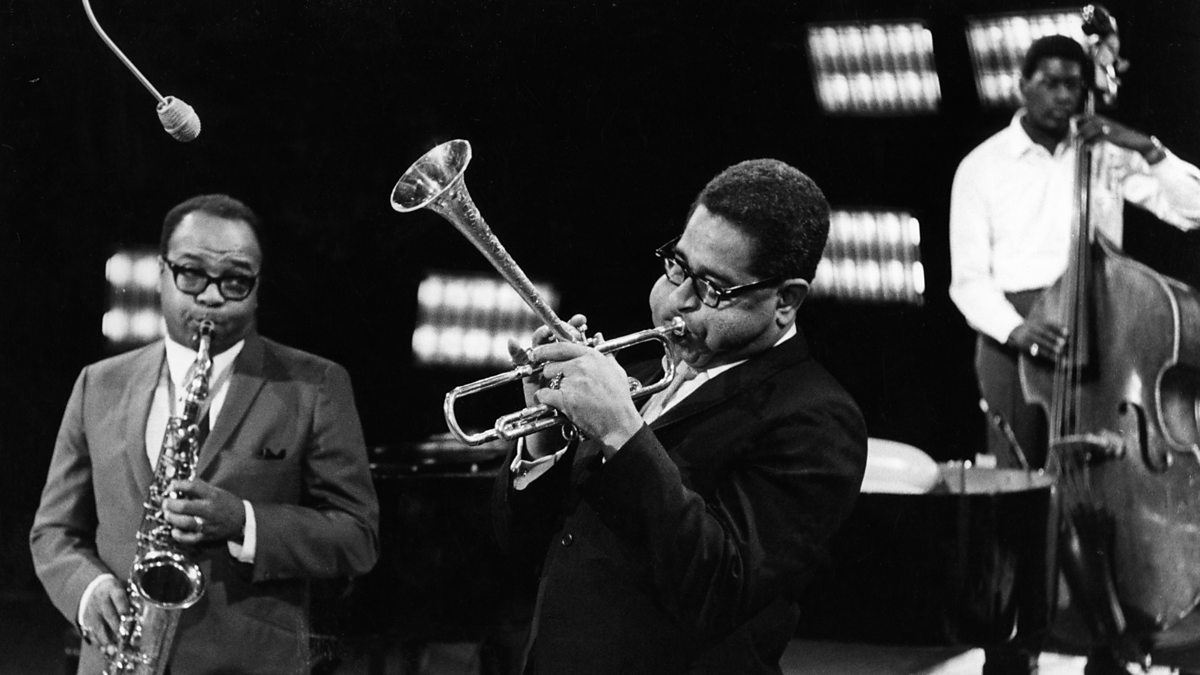Sat 17 June
4.00 Jazz Record Requests
Alyn Shipton introduces requests from across the jazz spectrum, including a recording of Joe Williams singing the swing classic The Comeback alongside the Count Basie Orchestra.
No JLU this week to follow, just Verdi grease.
12.00 Geoffrey Smith's Jazz
Though bebop was the radical, revolutionary face of post-war jazz, it could also be madcap fun. Geoffrey Smith explores the pop side of bop in pieces from Dizzy Gillespie, Woody Herman, Slim Gaillard and Charlie Ventura.
Charlie Ventura was allegedly a strong inspiration for Ronnie Scott when he was first discovering Bebop, representing as he did a populist bridge between the old and new worlds of jazz.
Mon 19 June
11.00 Jazz Now
Soweto Kinch presents Monocled Man in concert at the Cheltenham Jazz Festival, and Emma Smith talks to the band's leader, Rory Simmons.
Glad to see this lot still going - well worth tuning in for, imv. Sort-of an atonal Dave Douglas, from memory:
Adventurous listeners may also be interested in joining our World Music fellow-travellers in the following:
Tues 11.00 Late Junction
Max Reinhardt presents a collaboration session capturing the first meeting of Ghanaian kolongo player King Ayisoba, dub producer Adrian Sherwood and improvising reeds player Tom Challenger. Recorded at the BBC Maida Vale studios, the performance also features multi-instrumetnalist Skip McDonald, aka Little Axe. Plus a new work from US composer Michael Pisaro and electronics trio Colectivo maDam, cult American band Sun City Girls, and a recitation by pianist and vocalist Shirley Horn*.
Which, unless this is a different Shirley Horn, could be interesting, given that Ms Horn has been deceased some twelve years! (Unless they mean a different Shirley Horn, of course ).
).
4.00 Jazz Record Requests
Alyn Shipton introduces requests from across the jazz spectrum, including a recording of Joe Williams singing the swing classic The Comeback alongside the Count Basie Orchestra.
No JLU this week to follow, just Verdi grease.
12.00 Geoffrey Smith's Jazz
Though bebop was the radical, revolutionary face of post-war jazz, it could also be madcap fun. Geoffrey Smith explores the pop side of bop in pieces from Dizzy Gillespie, Woody Herman, Slim Gaillard and Charlie Ventura.
Charlie Ventura was allegedly a strong inspiration for Ronnie Scott when he was first discovering Bebop, representing as he did a populist bridge between the old and new worlds of jazz.
Mon 19 June
11.00 Jazz Now
Soweto Kinch presents Monocled Man in concert at the Cheltenham Jazz Festival, and Emma Smith talks to the band's leader, Rory Simmons.
Glad to see this lot still going - well worth tuning in for, imv. Sort-of an atonal Dave Douglas, from memory:
Adventurous listeners may also be interested in joining our World Music fellow-travellers in the following:
Tues 11.00 Late Junction
Max Reinhardt presents a collaboration session capturing the first meeting of Ghanaian kolongo player King Ayisoba, dub producer Adrian Sherwood and improvising reeds player Tom Challenger. Recorded at the BBC Maida Vale studios, the performance also features multi-instrumetnalist Skip McDonald, aka Little Axe. Plus a new work from US composer Michael Pisaro and electronics trio Colectivo maDam, cult American band Sun City Girls, and a recitation by pianist and vocalist Shirley Horn*.
Which, unless this is a different Shirley Horn, could be interesting, given that Ms Horn has been deceased some twelve years! (Unless they mean a different Shirley Horn, of course
 ).
).




Comment